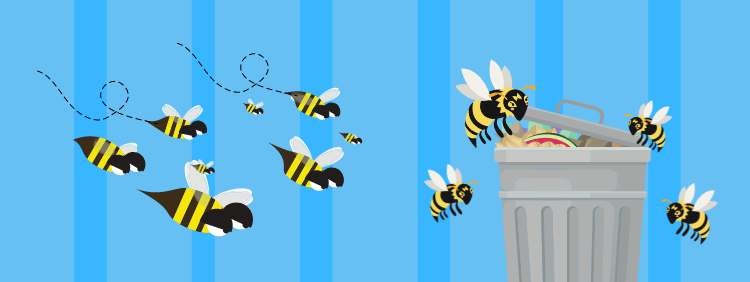Toronto Wasp Removal: Why Yellow Jackets Like Trash

The yellow jacket is one of the most common species of social wasps in Canada. Social wasps are those that live in large nests or colonies. Because these wasps are more aggressive, people often need to call pest removal in Toronto to deal with them on their property.
One thing that may be drawing wasps to your property in the first place is trash cans. Wasps forage in the garbage for food and so are particularly attracted to trash cans, especially in the late summer and early fall when food becomes more scarce.
Why Do Yellow Jackets Like Trash Cans?
Proteins and sugars are the main nutrients that a colony of yellow jackets needs to survive. Trash cans often provide both in abundance, so the worker wasps whose responsibility it is to collect food for the colony are often found swarming around them.
Adult yellow jackets typically do not need protein. The exception is the queen, which needs protein to lay eggs. Once the eggs hatch, the wasp larvae also need protein to grow. Wasps are predatory and can hunt and kill other insects to provide protein to the members of the colony that need it most. However, as the weather starts turning colder in the fall, other insect species start to die off or go dormant, making it more difficult for yellow jackets to find prey. Therefore, they start turning to trash cans as their primary source of protein.
Adult yellow jackets typically live on sugary carbohydrates. They can get this the way that bees do, by drinking nectar from flowers. They can also get it from the wasp larvae in the colony, which secrete a sugary fluid that the adults can eat. In the fall, flowers start dying off and nectar may be in a shorter supply than usual. Also, if the larvae eat less protein, they stop producing as much as the sugary secretion. Here again, wasps may supplement their diet of flower nectar by finding sugary leavings of soft drinks, ice cream, candy, and other sweet foods in trash cans.
How Can You Keep Yellow Jackets Out of Your Trash Cans?
Yellow jackets are not only annoying but dangerous. Their stingers are smooth without barbs, meaning that each yellow jacket can sting you more than once. When one yellow jacket stings, it releases a pheromone that tells any others in the area to attack. Therefore, you could receive multiple stings from multiple yellow jackets before escaping from them.
If yellow jackets are drawn to your property by trash cans, they are more likely to build a nest nearby. Here are some things you can do to deter them from your trash cans.
- Keep outdoor trash cans clean. Plastic liners prevent food residue from splashing onto the sides of the can and make it easier to remove the garbage, which you should do frequently. Wash garbage cans frequently, inside and out, to remove any food residue that might have collected on the sides. Do not underestimate yellow jackets’ sense of smell; even a small amount of food residue may be enough for them to detect and draw them to your property.
- Try to find an outdoor trash can with a lid that closes by itself. This makes the contents less accessible to yellow jackets.
- Place the trash cans as far away from your house as possible. This may not prevent yellow jackets from getting into your garbage, but it may help to keep them at a safe distance.
Learn More About Pest Control in Toronto From Truly Nolen
In situations where wasps are pestering you and pest control isn’t possible, for example, if you’re having a picnic in a park or on a beach, you can usually relieve the pressure with an “offering”. Despite their propensity for violence and malice, wasps would still prefer not to have to fight for their breakfast.
Take a single rind of watermelon or slice of orange, or a nearly-empty beer or pop can/bottle, and set it out away from yourself or your group. Anything with high sugar content will work. The wasps will locate it and begin farming it, and will defend this area instead of trying to seize control of your picnic. It works remarkably well, and certainly better than swatting at them or using bug spray.
Yellow jackets may be one of the most common wasp species, but it is not the only one. Pest control can only be effective if it is species-specific, so the first step in wasp removal in Toronto is identification. Find out more about our methods in detail.